SIGN UP FOR NEWSLETTER
Be the First to Know. Sign up to newsletter today
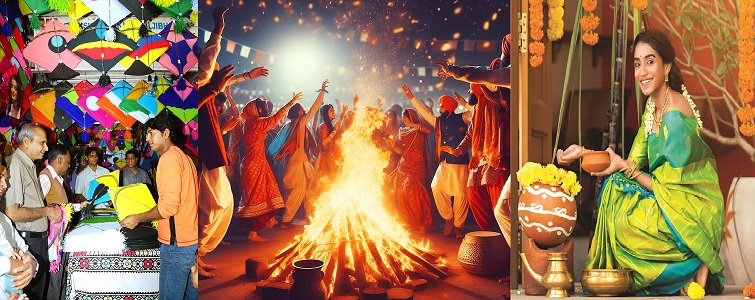
Jyoti
3685 views
add comment
Lohri 2025, Sankranti, Pongal 2025 & BIHU . The harvest festival is particularly important to farmers.
Kite flying,Sankranti Muggulu,(colored floor drawings) dressing up farm animals, eating rice, sugarcane, jaggery and sesame seeds are an important part of the festival.
Land, farm, animals & nature are worshipped together. The inter dependency is a cause to be recognised, understood & cherished. As a matter of fact, we are all aware that food security is fundamental to the well being of humans. And that is what the Thanksgiving festival aims to convey and celebrate. From the North to the South of India, mid January is considered an auspicious month. It is the time to celebrate winter harvest festivals. It is celebrated as Pongal,Lohri,Sankranthi & Bihu.The largely rural, agrarian festival is celebrated by farmers as a Thanksgiving to nature for the bountiful crops bestowed on them. Like other festivals, this is a communal festival and connects the people of India.
The day is marked in the calendar as the sun’s journey from the southern to the Northern hemisphere.It is the first day the transmigration of the sun into the zodiac of Capricorn ( known as makara rashi in the Indian calendar).Hence the festival is popularly known as Makar Sankranti. Prayers are offered to Surya, the sun god and Indira, the rain god. In addition, it is the end of the winter solstice and the end of the harsh winter in North India. In other words, it marks the beginning of the spring season.Read on to know more about the festivals (https://en.wikipedia.org/wiki/Lohri)
The much awaited harvest festivals will kick off in the country starting on the 13th of January 2024. The festival is known by different names in different parts of India–Lohri, Pongal, Bihu as well as Makar Sankranti . Pongal, is celebrated in South India and Makar Sankranti in several other regions of India. Lohri, essentially a Punjabi festival, is celebrated on January 13 each year with joy and enthusiasm in Punjab & North India Magha Bihu is a harvest festival celebrated in Assam in the North East. In addition, the harvest festival ,BIHU, is celebrated in Nepal too.

Villages and rural towns in Tamil Nadu are festooned with colourful flowers, garlands and buntings. There is an air of celebration and bonhomie everywhere. It is the Pongal festival. It is one of the most important festivals in Tamil Nadu. There is folk music playing from the loudspeakers, flashy and ostentatious decorations all over the town and groups of boisterous youngsters roaming around village fairs. Farmers are dressing up their cows and getting ready for the festival.It is certainly the time of the year that villagers look forward to. The landowners and the peasants come together in the village to celebrate this festival. Further, families come together during this time of the year.
The harvest festival is popularly known as the Pongal or Thai Pongal. Thai refers to the Tamil month, known as Thai masam (mid January to mid February) when Pongal is celebrated. It is hence referred as Thai Pongal. This year, it will be celebrated from 14th to 17th January 2024 in Tamil Nadu.
Food is the fundamental sustenance for human beings. Food from the farm is to be cherished. Agriculture is dependant on the vagaries of nature. Pongal is celebrated as a thanksgiving to the sun god and the rain god for their bountiful blessings. Cows and bulls are also worshipped as a part of the Pongal celebrations. For instance, these animals, as everyone is aware, are central to farming. It is the harvest season when rice, sugarcane & turmeric is harvested. This festival is celebrated in rural areas more than urban areas as agriculture is mainstream in the former.
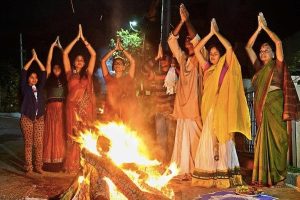
This first day is celebrated as Bhogi festival in honour of Lord Indra, the rain god. People clean homes and all the rubbish is thrown to burn. A bonfire is prepared and the unwanted items form the field and the homes are thrown into it. This symbolizes a new beginning. A special sweet,Poli,is prepared with flour and jaggery on this day. The flour is rolled like a stuffed roti(flat bead) with jaggery in the middle. This is similar to the Lohri & Bihu festival.
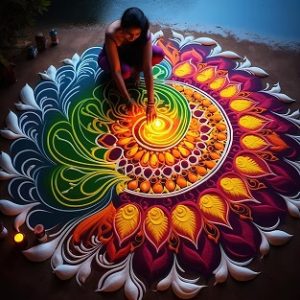
The 2nd day is the Pongal festival.In addition, homes are decorated with Rangoli or kolam . It is done with white rice powder and coloured powders. People are attired in new clothes. Sugarcane, coconut and bananas are offered to the God.
In the state of Andhra, the rangoli is known as Sankranthi Muggulu. The Sankranthi Muggulu are rangoli designs on the floor with coloured powders. Muggulu is Rangoli in Telugu language.
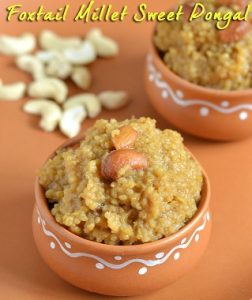
As a matter of fact, Pongal ,is also the name of the dish cooked on that day. Rice, lentils and milk are boiled on earthen pots over wood or coal in the courtyard.A turmeric plant is tied around the pot. The whole family gathers around the pot and cries “Pongalo Pongal” while clanking pots & pans, when the water boils over the pot. This symbolically refers to “ Let the food be bountiful and let our lives overflow with joy and happiness.”
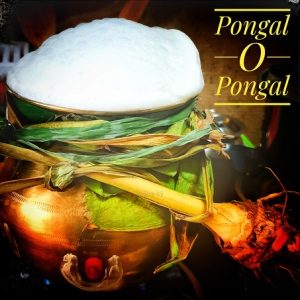
Further, a sweet dish with Pongal is also made by adding a bit of jaggery & milk to it. Turmeric and sugarcane is also placed together. Rice cakes in Assam for Bihu are similar.
Pongal Festival –These 2 varieties of Pongal are made on the 2nd day in all the homes.
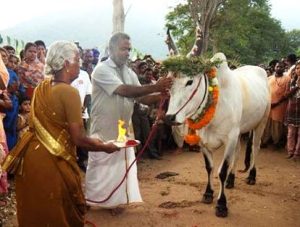
This is the auspicious day for cows.People worship the cows with garlands & colourful bells. The cows are brought to the village centre and paraded on the roads. Cattle race is part of the show.
Jalli Kattu (taming of the bull) is a big sport that is practiced in some areas. There is a money tied to the horn of the bulls and they are let loose by the owners. Young men chase the bull to retrieve the money. However, there is no physical harm done to the animal in this sport although there is a continuing controversy about playing this sport as compared to other sports. People do claim that it is cruelty to animals. It is a rural sport and there are several people lobbying to retain the sport.
Kanu Pongal or Kanum Pongal is celebrated on the forth day.
The turmeric leaf is washed and placed on the ground. Left over pongal, sweet pongal, turmeric rice and curd rice are all placed on the leaf, along with sugarcane and banana. Further, all the women gather around and call out to the birds. and feed them. They pray for the well being of their brothers and their families. The saying goes that as birds flock together, families should remain close together always. Hence the celebration. It is an occasion when married women visit their maternal homes to meet with their brothers and parents and seek their blessings. They are warmly welcomed with gifts.
Special gifts are given to girls on Pongal.
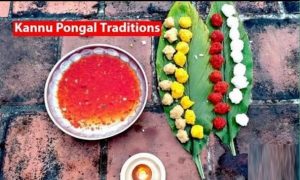
People celebrate the Pongal festival with music and dance performances all around the State. Shops offer special discounts on Pongal purchases. Therefore, make the most of this and enjoy shopping in Chennai.
Finally, visit the T Nagar and the Mylapore Market in Chennai to make Pongal purchases. Shops such as Sarvana Stores, RMKV and Pothys all have a special discount on Pongal purchases. The Mylapore Market area near the Kapalishwar Temple organises a Rangoli competition. Enthusiastic participants cover the entire stretch of road.Women also participate in traditional Board Games.
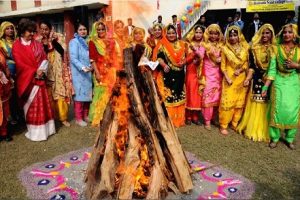
Similarly, Lohri marks the beginning of spring, especially in the state of Punjab, Himachal Pradesh and Haryana. It will be celebrated on 13th January. The festival is traditionally linked with the harvest of the rabi crop. On this day, farmers in Punjab celebrate the success of the winter crops. They gather around the big bonfire to enjoy traditional folk songs and dances to the beat of dhols. People toss munchies such as popcorns, peanuts,sesame seeds and puffed rice into the bonfire while circling around it. Traditional Lohri dishes such as Makki roti (corn flatbread) and sarson ki saag are gajak ( a sweet made of sesame )
The end of the harsh winter months & the beginning of the Spring season is celebrated as Lohri . Lohri is followed by Sankranthi festival.

This year, Makar Sankranti will be celebrated on January 14th. Finally, as per the Hindu solar calendar, the festival is celebrated to mark the shift of the sun into ever-lengthening days. It is also marked with kite flying.
Shop in Karol Bagh, Lajpat Nagar & Sarojini Nagar Markets for new clothes and utensils .
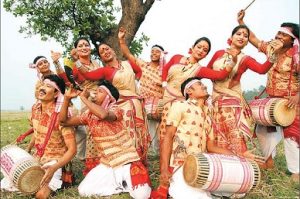
Further, people in the north east celebrate this festival as Magh Bighu 2025. There is a bonfire in the last day of the previous month and people rejoice, cook dinner and dance around the fire. For instance, rice cakes & sweets with coconut are made and young men and women dance and play games. In addition, bull fighting is also a sport that continues.In addition, shopping & wearing new clothes is an important part of the celebrations.
Shopping in Kolkata
The harvest festivals are celebrated around the fire and rice & sugarcane are cooked and eaten across India .It is thanksgiving for the rich harvest.
Also Read
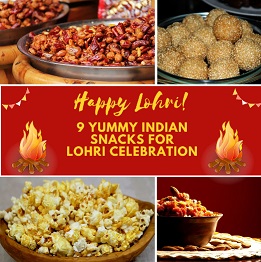
Be the First to Know. Sign up to newsletter today
Thanks, quite great article.
Heya just wanted to give you a brief heads up
Beautifully written.
Hi there mates, good paragraph
I am actually enjoying by these.